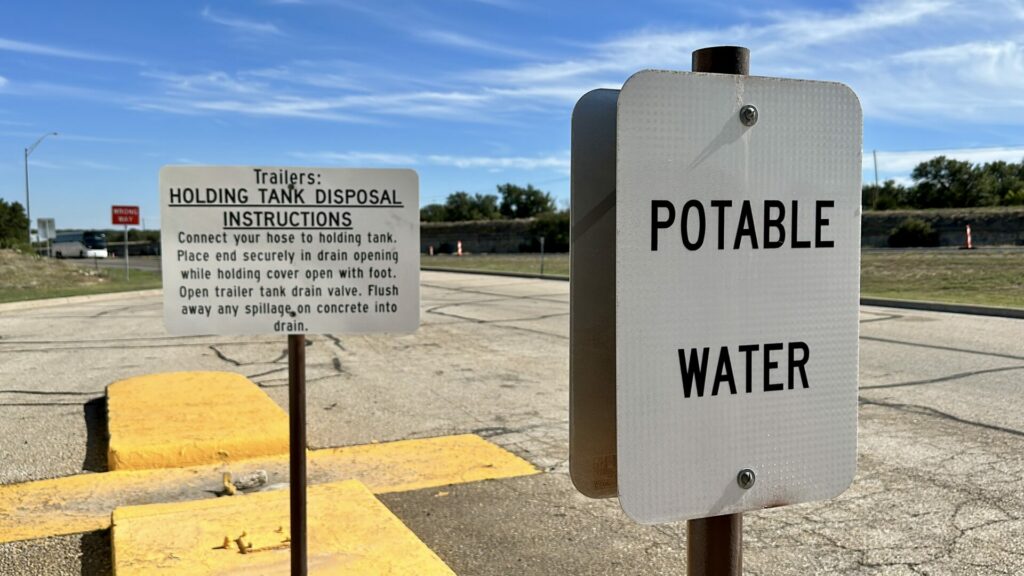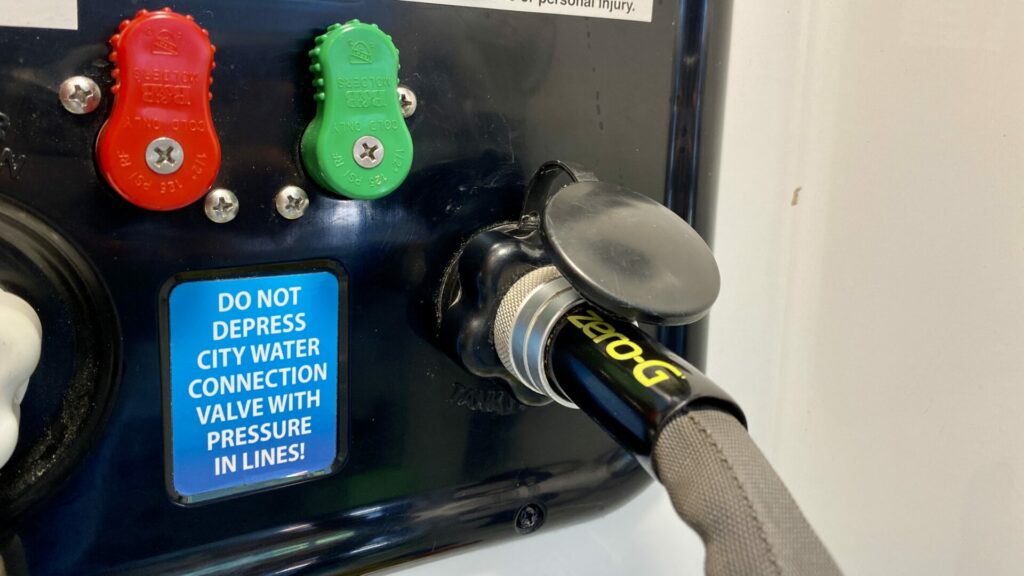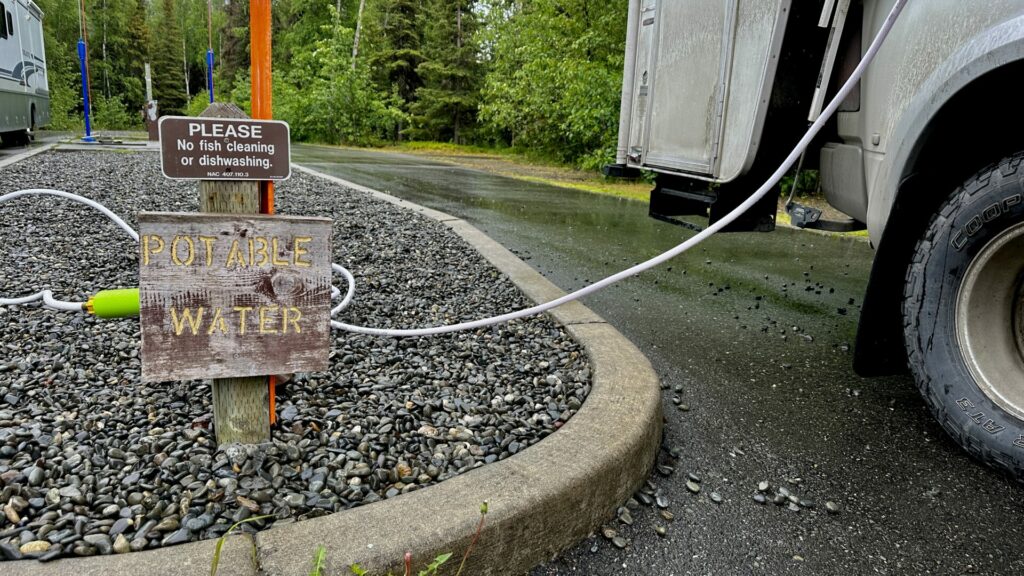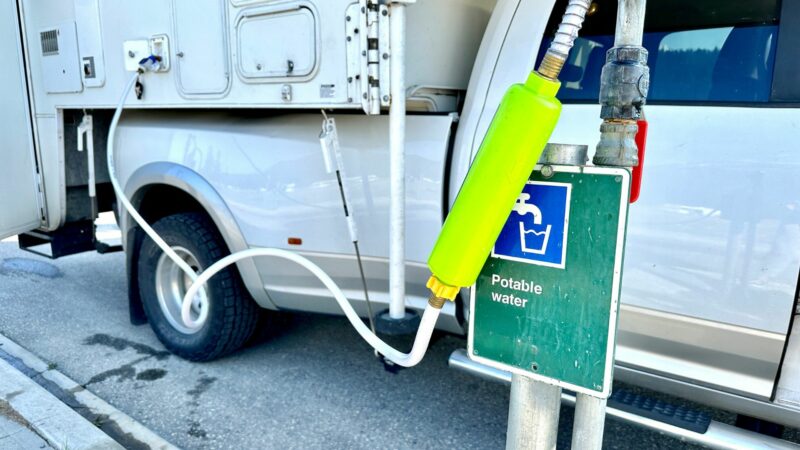Table of Contents Show
Finding the best RV fresh water hose may not be the highest of priorities for most RV owners.
However, in our opinion, the RV fresh water hose is one of the key pieces of a pain-free camping experience. It will be abused by the sun, hot temperatures, cold temperatures, constant water pressure, and more.
The wrong hose may poison you if it is not lead-free and listed as useable for drinking water.
Having RVed full-time for over four years and owning just about every type of RV freshwater hose, we have a little bit of real-world experience. We have recently revised our pick after two years of use from our previous top pick. The reason for the switch is detailed below. Let’s get started!
What Kind of Hose Is Safe For Drinking Water?
The Ecology Center in Ann Arbor, Michigan recommends an RV water hose made of polyurethane or rubber. When the center tested more than two dozen water hoses, it found that 75% of the PVC hoses contained phthalates.
In addition, these hoses had elevated levels of lead and bromine. To make sure your RV water hose is drinking water safe, stick with a polyurethane or rubber hose.
How Often Should I Replace My RV Drinking Water Hose?
If you use your RV a lot, perhaps traveling six months or more a year, you probably want to replace your RV drinking water hose every two years. Other RVers should replace their hoses every three years.
Depending on how you store your hose, how well you take care of your hose, and how often you use your hose, you can add or detract from its lifespan. Full-time RVers who stay mainly at campgrounds with full hook-ups rely daily on their RV drinking water hose and will need to replace it more often.
However, weekend warriors who may boondock or only use their hose a few times a year should get more life out of their hose as long as they properly store it when not in use.
Pro Tip: Should You Use a Separate Hose for Your Black Water Flush?

Signs You Need A New RV Water Hose
It’s not just age that indicates when you need a new RV water hose. You’ll also want to inspect it regularly to make sure there’s no kinking, rusting, or leaking.
1. Kinking in the Hose
Water can’t travel freely through a hose if there are kinks. You might be able to get out a few small ones, but once your RV water hose is bent significantly, you’ll need to get another one. It’s going to be hard to take a shower or wash dishes with water trickling through the showerhead.
2. Rusted or Corroded Fittings
When you inspect your RV drinking water hose, you’ll want to also check out the fittings. Look at both ends. If there is rust or corrosion, the fittings probably won’t attach well to the water spigot. You might notice leaking at the connection. You also don’t want rust getting into the water hose.
3. Leaking Hose
If the connection is leaking at the water spigot, the fitting might be too narrow because of corrosion. But the water hose might be leaking itself if you notice water pooling on the ground. Like a hose that has kinks, a hose that leaks won’t provide much water pressure to your faucets. Plus, you’re wasting water if it’s not making it through the hose.
Pro Tip: You might have wondered Is It Safe to Drink RV Park Water? Click to find out.
What To Look For In An RV Water Hose
Always check the label. If there’s a warning about not drinking from the hose, it probably contains lead. You want an RV drinking water hose that says “Lead-free” and “Drinking water safe.”
Choose a non-PVC hose. Your best RV water hoses will not have elevated levels of phthalates, bromine, or other elements that the Ecology Center found in its study. Although polyurethane water hoses are generally more expensive, they’re also safer.
But when you’re choosing an RV drinking water hose, you also have to consider a few other factors like length and weight. Consider the storage space you have for a water hose. If you can get a 50-foot hose, you’ll likely never run into an issue where the water spigot is too far away. You also don’t want a heavy, bulky water hose since you’ll be taking it in and out of the RV frequently.
Best RV Drinking Water Hoses
1. Our Pick: Teknor Apex Zero-G Water Hose
- 50% More Lightweight – Assures effortless handling
- Kink Resistant – Provides an uninterrupted flow
- Durable Design – Resists leaks, abrasions, and punctures
- Lead Safe – Safe drinking water
This is the fresh water hose we’ve used for years now. The Teknor Apex Zero-G fresh water hose is the perfect hose if you are looking to save weight. It comes in at only 2.4 pounds which is more than half the weight of our runner-up pick below.
The flexibility of this hose also allows for various storage options because of its flexibility. This hose doesn’t do as well as our previous number one pick when it comes to standard insulation so your water will more closely match the temperature outside. Make sure to tuck the hose under your RV for less fluctuation.
The durable exterior netting protecting the hose prevents rips and abrasions during normal use. We have had no rips or tears after a year of rough use. This is a great hose if you are looking to save on weight.
We recommend the 50ft hose because you never know how far you will be from the fresh water spigot. From experience, moving your RV after you already unhitched is a real bummer. It is drink water safe and lead-free and comes with a 5-year warranty.
The major reason this hose took the top spot was its flexibility and weight. Compared to the runner-up, we can disconnect this hose and throw it in a box in a few seconds.

- Professional Grade Drinking Water Hose: Camco’s Professional Grade RV fresh water hose is constructed with NSF/ANSI 61…
- Certified Lead-Free: Enjoy Camco’s CSA lead-free certified RV hose! It meets the highest standards, is CSA lead-free…
This heavy-duty RV freshwater hose is built to stand the test of time. It has nickel-plated brass ends that resist corrosion and strain-relief springs to help keep the ends protected where they receive the brunt of normal wear and tear. The 6-pound hose is thicker than an average hose and you can definitely feel it.
The durable exterior will keep the hose protected from most rips or punctures but also has a major downside, it’s not very flexible. This was our main reason for ditching this pick as the best RV fresh water hose and moving to our new number one pick.
While in the sun the hose is plenty pliable, however, if you are in cold weather of any kind the hose becomes rock solid. There were a few times that we couldn’t even roll it to put it away and it ended up just tossed into our storage compartment in frustration.
The extra thickness of the hose does have another benefit though, it provides a little extra insulation of the hose. This means that your water will stay colder in the summer and warmer in the winter.
This is not a true heated and insulated hose and it should not be used if it is going to be below freezing outside. However, it is rated to be used with liquids up to 180 degrees Fahrenheit.
It has an extra UV coating to resist the hose breaking down as it sits in the sun day after day. The most important benefit of this hose is that it contains no dangerous chemicals (like lead) and imparts no off-tastes.
3. Budget-Friendly: Camco 50-Foot RV Drinking Water Hose
- Premium Grade Drinking Water Hose: Camco’s premium-grade RV fresh water hose is constructed with NSF/ANSI 61 certified…
- Certified Lead-Free: Enjoy Camco’s CSA lead-free certified RV hose! It meets the highest standards, is CSA lead-free…
Similar to the premium Camco hose mentioned above, this Camco water hose is made of BPA- and phthalate-free PVC. It’s labeled safe for drinking water, too. It has the extra UV coating of the premium Camco RV water hose, which is essential to protecting it while it sits in the sun all day long.
However, it’s cheaper because it’s not made of thick premium material. You can feel the difference between this hose and the premium Camco hose. You might develop some cracks during the winter if you don’t properly take care of the hose.
And while that might mean less durability, it means more flexibility. You’ll be able to wrap this hose up more easily than the premium option. And it’s more lightweight.

Pro Tip: Once you get your perfect hose, it’s time to research filters. Here’s our favorite: The UV Acuva Water Filter.
How To Lengthen the Life of Your RV Water Hose
Although the best RV drinking water hoses aren’t super expensive, you don’t want to have to buy one every camping season. Here are a few tips on proper care so you can lengthen the life of your water hose.
Keep Your Hose Straight While In Storage
As mentioned earlier, kinks can lead to damaged water hoses and permanent problems with water pressure. While coiling the hose on camping trips saves space, you don’t want to do this tightly. Use big loops – at least as big as you have storage space for – or use a specialized reel that will prevent kinking.
When the camping season has ended, and you’re putting your RV drinking water hose away, try to keep it straight or at least in fewer coils. This ensures that when you get it back out next season, there are no permanent kinks to prevent water flow to your RV.
Keep Your Hose Out of the Sun
One of the biggest tips for properly caring for your water hose while in use is to keep it out of the sun. You might not have a choice at some campsites, but if you can prevent direct sunlight from hitting the hose, you’ll lengthen its lifespan. UV rays can break down the material and damage the hose.
This also goes for storing your hose. Keep it away from windows or skylights where direct sunlight might be able to reach it. Use large coils or keep it completely straight and store it in a place away from sunlight to make sure your RV drinking water hose will be ready to use the next camping season.
Keep Your Hose Dry When Not In Use
Finally, during camping trips, keep your hose dry. You want to keep the moisture off of the fittings, especially. This will prevent rust and corrosion.
Although it’s impossible to completely clean out every last drop of water inside the hose, shake it out as much as you can. Also, by hanging the hose, gravity will help direct the water down and out of the hose. You don’t want to return in a few months to find bacteria growing in your RV drinking water hose.
Choose One of These Best RV Water Hoses For Your Next Camping Trip
One of these best RV water hoses will make your camping experience more enjoyable. You’ll have a durable hose that you won’t have to replace every season, and you’ll have safe drinking water coming through your RV’s pipes.
Camping is supposed to be fun and adventurous. Don’t ruin your weekend with a hose that has elevated levels of lead, bromine, or phthalates. Stay safe and order one of these best RV drinking water hoses when it’s time to replace yours!
Is there another RV water hose you’d add to our list?
Last update on 2024-11-20 / Affiliate links / Images from Amazon Product Advertising API










I just read your article, “The Best RV Fresh Water Hose (2020)”. Your Best RV Fresh Water Hose – Top Pick does not appear to be for drinking. Am I missing something.
Just marketing. It is labeled as “Drinking Water Safe & Lead-Free” but this one is not marketed directly toward RVers but as a commercial heavy duty option. They have a blue one marketed specifically for boats and RVs but it is only 1/2″ diameter versus 5/8″ diameter of the black one. https://amzn.to/2AhnL2H
I got the one from WalMart at half price with a 3 year warranty, same specs, Fiberjacket as they didn’t have the Zero G. Its green and we love it.
I’ve had the Zero G for about a year. I love it–so much easier to stow. It had a slight taste at first, but before putting it in use, I left it filled up with water at home for a week or two, occasionally changing the water. (You can buy male and female end caps for hoses.)
We haven’t noticed any hose taste since.
I got my hoses a long time ago from RV water filter store.
They are not cheap, but they’re rated for very high water pressure and have great fittings. That allowed me to put the pressure regulator on the fitting at the coach rather than at the pedestal. I’ve been at campgrounds with extremely high water pressure with no issues.
The best hose I ever owned is a stainless steel 50 footer. It is safe for drinking water although I always use bottled water. Never kinks. Rolls up better than anything on the market. Will not snag, rip or tear. Love mine.